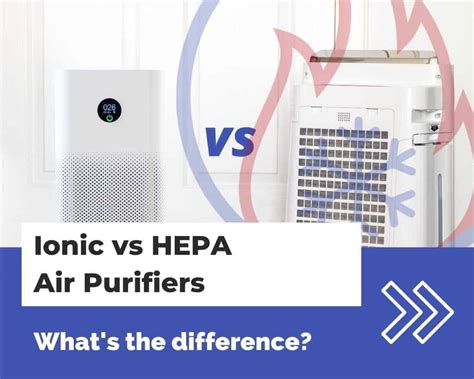Introduction
As global air pollution worsens, concerns over indoor air quality have intensified, making air purifiers a widespread solution. Among the various air purification technologies, High-Efficiency Particulate Air (HEPA) air purifiers stand out for their exceptional performance. This article delves into the landscape of air purifiers, contrasting HEPA technology with other types and providing insights for informed decision-making in 2025.

What is a HEPA Air Purifier?
A HEPA air purifier employs a high-efficiency particulate air filter designed to capture airborne particles with exceptional efficiency. According to the U.S. Department of Energy, HEPA filters can remove up to 99.97% of particles as small as 0.3 microns from the air passing through them. This includes a wide range of contaminants, such as dust, smoke, pollen, mold spores, and bacteria.
HEPA vs. Other Air Purifier Technologies
Electrostatic Precipitators (ESPs)
ESPs use an electrical charge to attract and collect particles. While they can be effective in removing larger particles, ESPs are less efficient in capturing smaller particles compared to HEPA filters. Additionally, ESPs can generate ozone, a potential respiratory irritant.
Carbon Filters
Carbon filters primarily target gaseous pollutants, such as odors and volatile organic compounds (VOCs). They have limited ability to remove particulate matter, making them less suitable for addressing indoor air quality concerns dominated by airborne particles.
UV-C Light Purifiers
UV-C light purifiers emit ultraviolet radiation to kill microorganisms. However, they do not physically remove particles and may not be effective against all types of airborne contaminants. Moreover, excessive exposure to UV-C radiation can be harmful to human health.
Benefits of HEPA Air Purifiers
Superior Particle Removal
HEPA air purifiers excel in removing a wide range of airborne particles, including those that are harmful to human health. They are particularly effective in mitigating indoor air pollution caused by dust, smoke, and allergens.
Reduced Health Risks
Exposure to indoor air pollutants can lead to respiratory issues, heart disease, and other health problems. HEPA air purifiers help reduce these risks by effectively removing harmful particles from the air.
Improved Air Quality and Comfort
By eliminating dust, smoke, and other airborne contaminants, HEPA air purifiers improve indoor air quality, making it more comfortable and pleasant to breathe.
Factors to Consider When Choosing an Air Purifier
Size and Coverage Area
HEPA air purifiers come in various sizes and are designed for different coverage areas. Choose an air purifier that is appropriately sized for the space where it will be used.
Airflow Rate
The airflow rate of an air purifier determines how quickly it can circulate and clean the air in a room. Look for air purifiers with a high airflow rate to ensure efficient cleaning.
Noise Level
HEPA air purifiers may produce some noise during operation. Consider the noise level when choosing an air purifier, especially if it will be used in a bedroom or other quiet areas.
Filter Replacement
HEPA filters need to be replaced regularly to maintain optimal performance. Choose air purifiers with readily available and affordable replacement filters.
Energy Efficiency
Since air purifiers run continuously, energy efficiency is an important consideration. Look for air purifiers with Energy Star certification, indicating low energy consumption.
Potential Applications of HEPA Air Purifiers
In addition to residential and commercial settings, HEPA air purifiers have a wide range of potential applications, including:
Hospitals and Healthcare Facilities
HEPA air purifiers are essential in reducing the risk of healthcare-associated infections by effectively removing airborne pathogens.
Schools and Daycare Centers
Ensuring clean indoor air is crucial for the health and well-being of children. HEPA air purifiers can help create healthier learning environments by reducing exposure to allergens and respiratory irritants.
Industrial Settings
HEPA air purifiers can be used in industrial settings to control dust and other airborne contaminants that may pose health risks to workers.
Transportation
HEPA air purifiers can improve air quality in various transportation modes, such as buses, trains, and airplanes, reducing exposure to pollutants and creating a more comfortable travel experience.
FAQs
Q: Are HEPA air purifiers effective against COVID-19?
A: Yes, HEPA air purifiers can effectively remove airborne particles, including viruses such as COVID-19.
Q: How often should I replace HEPA filters?
A: The frequency of filter replacement depends on usage and air quality. Generally, HEPA filters should be replaced every 6-12 months.
Q: Can HEPA air purifiers remove odors?
A: HEPA air purifiers primarily remove particulate matter, while odors are typically caused by gases. However, some HEPA air purifiers may incorporate activated carbon filters to address odors to some extent.
Q: What is the difference between a true HEPA filter and a HEPA-type filter?
A: True HEPA filters meet the High-Efficiency Particulate Air (HEPA) standard, defined by the U.S. Department of Energy, and can remove up to 99.97% of particles as small as 0.3 microns. HEPA-type filters may not meet the same standards and may have lower efficiency.
Q: Are HEPA air purifiers safe for pets?
A: Yes, HEPA air purifiers are generally safe for pets, as they do not produce harmful emissions or ozone.
Conclusion
HEPA air purifiers offer a highly effective solution for improving indoor air quality and reducing exposure to harmful airborne particles. With their superior particle removal capabilities, HEPA air purifiers are the preferred choice for a wide range of applications, from residential and commercial settings to healthcare facilities, schools, and even transportation. By investing in a HEPA air purifier, you can create a healthier and more comfortable indoor environment, mitigating health risks and enhancing overall well-being.





















